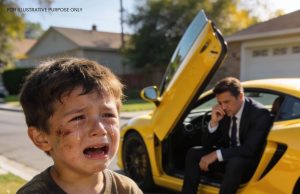A storm can alter everything: how offering one cup of coffee reshaped a life.
The blizzard rolled into Millstone far sooner than anyone expected. By the time I pulled into the gravel lot of my small highway diner, snow was already tumbling down in heavy curtains, covering the pavement and fields in white. I hadn’t intended to open that night—the roads were far too treacherous—but then I noticed a long row of semi-trucks pulled over along the shoulder. Their headlights glowed through the swirling snow, and I could make out roughly a dozen men clustered together, bracing against the wind.
One of them stepped forward and tapped gently on my door. Frost clung to his beard, and weariness clouded his eyes.
“Ma’am,” he asked, voice hoarse, “any chance you’ve got coffee? We’ve been stranded for hours. They closed the highway. We won’t make it to the next stop tonight.”
I hesitated. Running the diner alone was already challenging, and feeding twelve hungry drivers could easily overwhelm me. But when I looked at their faces—tired, anxious, desperate for warmth—I remembered what my grandmother used to say: If you’re unsure, feed people anyway. So I unlocked the door, switched on the lights, and waved them inside.
They stamped snow off their boots and sat in silence at the booths. I brewed coffee, and before long, I was whisking batter, flipping pancakes, and frying bacon like it was a bustling morning rush. Slowly, the quiet gave way to soft conversation and then laughter. They kept thanking me, calling me “the angel wearing an apron.”
I had no idea then that opening my door would not only change their evening—it would redirect my entire future, and in a small way, the future of the whole town.

By the next morning, the storm had intensified. News on the radio confirmed their fears: the highway would remain closed for at least two more days. They weren’t going anywhere—and neither was I.
The diner transformed into a shelter. I rationed what I had, turning sacks of flour and cans of beans into enough meals to feed thirteen people. The truckers didn’t just sit by. They helped however they could: chopping vegetables, scrubbing dishes, even repairing the faulty heater in the storage room. Mike rigged a setup to keep the pipes from freezing using spare parts from his truck. Joe shoveled the doorway over and over so snow wouldn’t lock us inside.
Before long, we felt less like strangers and more like a family. At night, they talked about life on the road—the close calls, the missed anniversaries, and the loneliness you never really get used to. I told them about my grandmother, how she’d left me this diner, and how I’d been struggling to keep the doors open.
“You’re holding on to more than a restaurant,” one of them told me quietly. “You’re holding on to a piece of America.”
Those words settled deep in me. For the first time in months, maybe years, I felt like I wasn’t fighting alone.
But as each hour passed, a single worry gnawed at my mind: when the snow cleared, would this temporary little family vanish as quickly as it formed?
On the third morning, the snowplows finally pushed through. The truckers packed up, thanked me with firm handshakes, strong hugs, and promises to stop by if they ever traveled this route again. I stood in the doorway, watching their rigs rumble back onto the open road. The diner felt unbearably quiet.
Yet the story was not over.

Later that same afternoon, a journalist knocked on my door. Someone had taken a picture of the twelve trucks lined up outside my tiny red diner in the middle of the blizzard—and it had gone viral. The headline read: “Small-town diner becomes refuge during winter storm.”
Within a few days, travelers from nearby towns began showing up just to eat at the place that sheltered the stranded truckers. Business doubled. Then tripled. People said they came to support the woman who opened her doors when no one else would.
And the truckers kept their word. They returned—bringing co-drivers, friends, and more stories—calling my diner “the heart of the Midwest.” Soon, my parking lot was rarely empty.
A simple act of compassion had turned my little restaurant into something beloved.
But more than that—it reminded me of my grandmother’s wisdom: when you feed someone in their hour of need, you nourish more than their stomach. You touch their heart.
And sometimes, they return the gift—and fill yours.
















